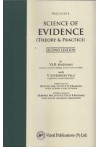- Author(s): V.S.R. Avadhani, V. Soubhagya Valli
- Publisher: Vinod Publications (P) Ltd.
- Edition: 2 Ed 2017
- ISBN 13 9788193250808
- Approx. Pages 1208 + Contents
- Delivery Time 3-5 working days (within Kerala & South India) (Others 7-9 days)
............................................................................................................................
Description
'Law' is simply an 'Order'. It is a system of principles and rules which of human conduct, being the aggregate of those commandments and principles which are either prescribe or recognized by the governing power in an organized jural society as it will in relation to the conduct of the members of such society, and which it undertakes to maintain and sanction and to use as the criteria of the actions of such members. Evidence law, no doubt, is one part of the major spectrum of 'Law'. Before dealing with "evidence law", it is important to discuss about the concept of "evidence" in general since evidence and law of evidence are two different things. The word " evidence" is originated from a Latin term "evidentia" which means to show clearly, to make clear to the sight to discover clearly certain, to ascertain or to prove. Thus, evidence is something, which serves to prove or disprove the existence or non-existence of an alleged fact. The party who alleges the existence of a certain fact has to prove its existence and the party, who denies it, has to disprove its existence or prove its non-existence. However, all facts traditionally considered, as evidence may not be evidence in the eyes of evidence law. Rather, evidence is something presented before the court for the purpose of proving or disproving an issue under question. In other words, evidence is the means of satisfying the court of the truth or untruth of disputed fact between the parties in their pleadings.
............................................................................................................................
Contents
Chapter 1: General Introduction
Chapter 2: Relevancy of Facts
Chapter 3: Presumptions
Chapter 4: Estoppel
Chapter 5: Burden of Proof
Chapter 6: Admissions
Chapter 7: Statements by Persons who Cannot be Called as Witnesses
Chapter 8: Confessions
Chapter 9: Relevancy of Statements made under Special Circumstances
Chapter 10: Proof of Facts
Chapter 11: Of Witnesses & Their Evidence
Chapter 12: Of Documents & Documentary Evidence
............................................................................................................................
Author Details
V.S.R. Avadhani: Formerly Secretary General, Supreme Court of India
V. Soubhagya Valli: Corporate Legal Consultant
............................................................................................................................

